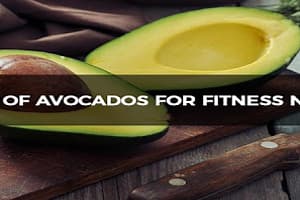Benefits of Avocados for Fitness Nutrition

There is no secret food to keep the body healthy and fit but a balance between the right food consumption and regular physical activity. Consuming nutrient-dense food items can nourish the body and help in boosting overall health and well-being. Hence, there are many food items that are being promoted as superfoods for the body. One of the latest famous food to join this list is avocado.
The tree avocado originated in America that is native to south-central Mexico. But because of its health benefits, it is famous worldwide. As per the USDA, an avocado contains:
-
4g protein
-
29.5 g fat
-
13.5g fiber
-
42.2 μg vitamin K
-
163 μg folate
-
975mg potassium
-
20.1mg vitamin C
-
58.3mg magnesium
-
105mg phosphorus
But Avocado is high in fat, is that bad?
Firstly, not all fatty acids work the same in the body as some of the fatty acids are known as essential fatty acids because they are required for overall functions including immunity, joint health, cognitive function, and more. Avocado fat includes a mix of monounsaturated and polyunsaturated fatty acids, which are part of essential fatty acids along with a limited amount of saturated fat. Hence, the Fat present in avocado is an actually good fat for the body.
This fat content will add more satiety to the meal on consumption and along with fiber, it will keep you full for longer, helping in avoiding overeating and binge eating. It can easily be added to a meal in the form of a spread, smoothie, or just on the side to add the punch of nutrients.
Fitness nutrition benefits
Avocados are loaded with potassium, vitamin C, vitamin B complex, and more that help in adding required nutrients to the diet. Whether your goal is to gain muscle or to lose weight, avocado can be a part of your diet to help in achieving your health and fitness goals.
Adding avocado in breakfast or snacks in between meals keeps you full for longer and helps in controlling cravings by providing better satiety to the meal. The good fat present in avocado can also help in managing lipid profiles by helping to reduce LDL and cholesterol levels in the body. Reducing unwanted fat from the body can help in reducing the risk of various lifestyle diseases along with enhancing immunity and cardiovascular functioning. Hence, working on a calorie-deficient diet can help further reduce fat from the body.
The fat in avocado can also help improve the energy levels of the body if included in a calorie surplus diet. Good fat and antioxidants support the recovery and repair of muscle tissue that got wear and tear because of increased physical activity like strength training. Adding avocado along with some protein-rich food can help in balancing the nutrient profile of a meal.
Adding avocado to the diet
Salad: Avocados add a rich and smooth flavor along with better satiety to salads. For example, chopped avocado can be added to eggs, grilled chicken, mixed boiled beans, or mixed vegetables to make the salad.
Smoothie: Avocados can be blended with dairy milk, almond milk, soy milk, or even ice to get a smooth texture. The nutrient content of the smoothie can be enhanced by adding other ingredients as per the requirement.
Sandwich spread: Mashed avocado can be used as a sandwich spread instead of unhealthy packed spreads. Adding further vegetables along with some protein-rich food items can make it a balanced meal.
On the side: Adding sliced or mashed avocados on the side along with the meal can add better satiety and nutrients to the balanced meal.
Avocado oil: Avocado oil can be used as a salad dressing. However, this lacks fiber and some other nutrients as oil is been extracted from avocado will have only fat-soluble vitamins.






